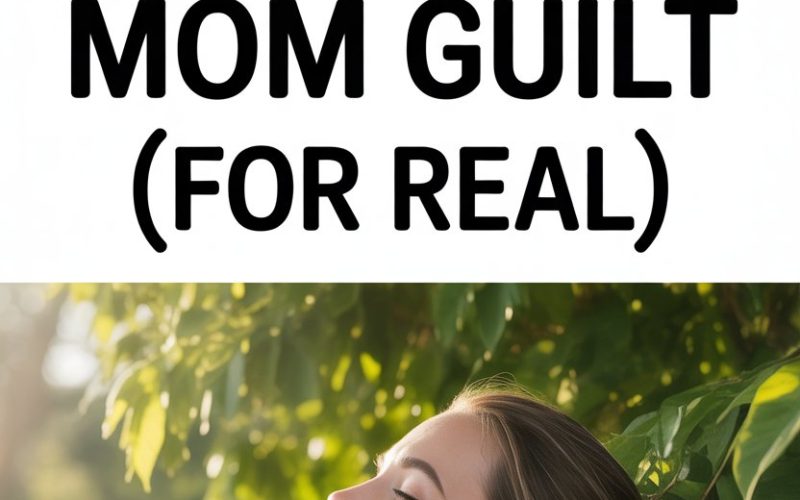If there’s one thing mums seem to collect more than odd socks and drawings of unidentifiable animals, it’s guilt.
That nagging voice that shows up during the school run, bath time, and even in your dreams (where, apparently, you still pack the wrong snack).
Let’s be honest: mom guilt is exhausting. It’s the emotional tax nobody tells you about at your baby shower.
But here’s the good news—there are ways to pack it up and send it on a long holiday.
Here’s how to let go of the mom guilt, properly this time.
Recognise What Mom Guilt Really Is
Mom guilt usually pops up whenever you feel like you’re not doing enough—for your kids, your partner, your job, the neighbours, your Aunt Marge… the list goes on. You’re not alone here.
According to a Bright Horizons survey, a whopping 86% of mums say they feel guilty about balancing work and home life. That’s practically everyone.
Often, these feelings stem from impossible standards set by social media, well-meaning relatives, and the noisier corners of your own mind. The guilt isn’t always rational.
It’s a sneaky little gremlin whispering, “Everyone else has it together—why don’t you?”
Here’s the truth: No one has it together. Not even the mum who manages to wear actual trousers to school pickup.
Pinpoint Your Triggers
That creeping sense of guilt? It usually has a source. Maybe it’s the third night this week you’re serving beans on toast. Or the fact you actually look forward to Mondays because nursery is open again.
Spend a day noting when you feel the guilt spike. Is it linked to screen time? Missing a recital due to work? Losing your temper?
Once you spot the patterns, you can address them head-on—rather than feeling like you’re being smothered by a wet towel of ‘shoulds’.
Challenge the “Perfect Parent” Myth
If every child needed a parent who never made a mistake, we’d all be up a creek without a paddle. The “perfect mum” doesn’t exist beyond Instagram highlights.
Psychologist Dr. Donald Winnicott coined the term “good enough mother”, suggesting that children don’t need flawless parenting—just a caring, mostly-consistent presence.
In fact, trying to be perfect can actually backfire, teaching kids to set impossible standards for themselves.
Embrace the power of “good enough.” Not only is it realistic, it’s actually better for your children.
Stop Comparing Your Behind-the-Scenes to Other People’s Highlights
No one posts the video of their toddler licking the cat or the mountain of laundry waiting to be folded. Instead, we see posed family outings, homemade organic snacks, and suspiciously clean playrooms.
Studies from the Royal Society for Public Health show social media can seriously mess with our self-esteem, especially for parents. It’s worth repeating: Instagram is not real life.
If looking at other people’s posts makes your guilt levels spike, give yourself permission to mute, unfollow, or take a break.
Practice Saying No Without Guilt
The requests come non-stop—school bake sales, family events, extra work meetings, “Mum, can you sew me a dinosaur costume by tomorrow?” Learning to say no (and mean it) can feel like breaking a secret parent code.
But you’re allowed to protect your own time and energy. Every time you say “yes” to something you don’t want to do, you’re saying “no” to something else—usually your own sanity.
A simple, “I can’t commit to that right now,” is all you need.
No apologies, no elaborate explanations. Just no, and a smile.
Give Up on Guilt-Driven Parenting
Guilt shouldn’t be making your parenting decisions. That’s like letting your Sat Nav be operated by a toddler—it might be loud, but it has no idea where you’re trying to go.
Next time you find yourself reaching for the craft supplies because you feel guilty about yesterday’s TV marathon, ask yourself: Am I doing this because I want to, or because I feel bad?
Parenting by guilt is unsustainable and leads to burnout. Connection is what matters, not compensating for every perceived failing.
Let Your Kids See You as Human (Because You Are)
Perfection is not relatable. Kids don’t need a robot—they need a real person who loves them, makes mistakes, and keeps showing up.
If you lose your temper or forget something, acknowledge it. “I was grumpy this morning because I didn’t sleep well. Sorry, mate.”
Research on parental repair shows that children actually benefit from seeing their parents own up to mistakes and make amends. It teaches resilience, empathy, and self-forgiveness.
And if you’re feeling dramatic, you can always add: “Did you know grown-ups have tantrums too?”
Find Your People
You’re not the only one who’s ever let their child eat chips for tea or sent them to school with toothpaste on their jumper. Spend time with parents who are honest about their struggles.
Nothing deflates guilt quite like group laughter over shared disasters. Parent support groups, WhatsApp chats, or even the mum at soft play who looks as tired as you—these are your tribe.
If you’re struggling to find your people offline, consider online communities like Mumsnet or Peanut for solidarity and advice.
Take Back Some Time for Yourself—Without Apology
It’s easy to forget you’re a person, not just a snack-fetcher and referee. But every parent needs a bit of breathing space.
Carve out regular moments—ten minutes with a cup of tea, a walk around the block, reading a few pages of a book that doesn’t rhyme. You don’t need to justify it. Self-care isn’t selfish.
When you nurture yourself, you’re teaching your kids that grown-ups matter too.
If guilt creeps in, remind yourself: a burnt-out parent isn’t much use to anyone.
Flip the Script—Notice What’s Working
Guilt is a master at pointing out what you haven’t done. Flip the script by focusing on what you have.
Did you cuddle your child today? Did you remember their P.E. kit? Did you keep everyone alive and mostly clothed? That counts.
Try jotting down three small wins each evening. Studies on gratitude journaling show that it boosts mood and resilience.
Over time, you’ll train your brain to spot the good stuff, not just the gaps.
Get Professional Support if You Need It
If the guilt feels overwhelming or never lets up, it might be time for backup. Perinatal psychologist Dr. Emma Svanberg reminds us that persistent guilt can be a sign of anxiety or depression—conditions that deserve support, not silence.
Your GP or a mental health professional can help you untangle what’s going on. There’s nothing weak about asking for help. You’d want your children to reach out if they were hurting, right?
Remember What Your Kids Actually Need
The world will keep selling you on “more.” More activities, more organic snacks, more picture-perfect memories. But kids are simple creatures at heart.
Research from the Harvard Center on the Developing Child shows that the single most important thing for healthy development is a loving, responsive connection.
Not perfectly planned days, but time together—reading a book, building towers, even just a cuddle on the sofa.
It’s not about always getting it right. It’s about showing up, again and again, with love.
Guilt-Free Is Possible (Yes, Even for You)
Every parent is a work in progress. Some days the only homemade thing at your house is the mess. Some days, you absolutely nail it, and others you’re just glad everyone made it out the door.
Guess what? That’s more than enough.
The next time guilt sneaks in, remember: real families are messy, loud, and beautifully imperfect. Your children don’t need a superhero—they need you, in all your perfectly flawed glory.
Now, go pop the kettle on. You’ve earned it.




